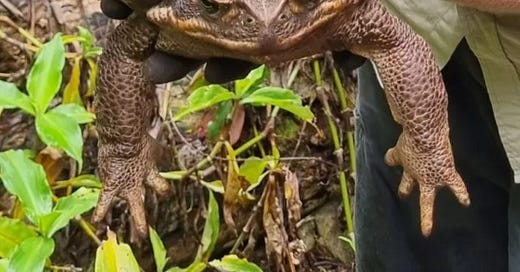No one expected the toads to be killers.
Or rather the Australians assumed the amphibians would stick to slaughter of the convenient and beneficial sort, a staggering failure of imagination.
Rhinella marina, a giant neotropical toad better known as the cane toad, was imported to deal with beetles ravaging Australia’s sugar cane industry in 1935. They devoured New World pests in the Americas, so why not give them a shot in Australia?
Unfortunately, the imported toads rarely ate the voracious beetles munching on Australia’s sugar cane. But more worrying was what they did eat — virtually everything else. The toads hoovered up honey bees, ants, termites, small cats and dogs, crickets, snails, frogs, snakes, and much else that slithered, swam, or walked.
As the toads multiplied, Australian predator species moved in for a feast. And then they died. The toads are highly poisonous, but native predators have no avoidance instinct for them and can’t survive their toxins. Many of northern Australia’s predators have gone extinct or become extremely rare.
Northern Australia’s ecosystem has been ravaged, and the toads spread further each year.
How did this catastrophe happen?
First-Order Thinking.
First-order thinking looks no further than the obvious or expected consequence of an action and ignores most of what’s downstream. It’s quick and easy and we do it all the time.
The Australian agricultural scientists looked at their problem this way:
We have inconvenient beetles -> Cane toads eat beetles > Therefore, imported cane toads will eat our beetles. Let’s do it.
Second-order thinking is rarer, more deliberate, and requires imagination, but is also more powerful and predictive.
At its heart lies a simple question: and then what?
Cane toads might eat our beetles. But then what?
Third-order thinking asks you to ask that question again, using your imagination and understanding of the world to predict consequences even further in the future.
What will happen when I quit my job to travel the world? And then what? And then what?
What if I ask her to marry me? And then what? And then what?
What if I choose marathons over weightlifting? And then what? And then what?
Premeditatio Malorum
The ancient Stoics had a form of second-order thinking called premeditatio Malorum, or the premeditation of evil things. It asks us to predict what might go wrong, both so we’ll keep calm when things don’t pan out, and so we have a response ready if they don’t.
When you wake up and start your day, review your schedule and decide where delays, stubbornness, incompetence, or unforseen consequences may hinder you. Having considered this, decide if you need to change your plans. Even if you don’t, plan a response for if things go sideways.
More Second-Order Thinking Questions:
Knowing many interventions cause more harm than good, how can I approach this situation like Hippocrates with a, “first, do no harm,” principle?
How will my friends, family, employees, and competitors react to this? What would my mental mentor say?
How will this be playing out in a month? In a year? When I’m in retirement?
Am I confusing action with outcomes?
Is this problem actually a nail, or does it only look that way because I’ve only got a hammer?
Second-Order Thinking about Second-Order Thinking
People rarely get praised or receive raises for mistakes they don’t commit.
If an Australian agricultural scientist predicted the disastrous consequences of the cane toad plan, it’s unlikely they’d be promoted to agency chief.
But much of what’s good in life is unpleasant up front and good downstream, and second-order thinking helps us realize it. Saying yes to a $2,000 vacation when you’re 20 probably seems harmless if the money to pay for it is in the bank.
But if we explore saying no to it, and then ask “and then what?” and assume we invest the money in the stock market at 7% interest until we’re 75, we’d be able to consider if a future $82,631 is worth more to us than the trip.
This sort of long-horizon thinking takes work, but it can give us a leg up in almost any endeavor.
Thanks for reading Socratic State of Mind.
If you enjoyed this article, please like and share it, which helps more readers find my work.





Thanks for your today's post !!! 👍👍👍 🔥🔥🔥
{...is going through life with just a hammer, smashing away and wreaking havoc...} You NAILED it !!!
About investing: This assumes a person is able to "bear the pain" of deferred (but highly enhanced) gratification. Something that unfortunately has been thoroughly "hammered out" of current brain-matter with an almost limitless (but at 23% pA.) credit system.